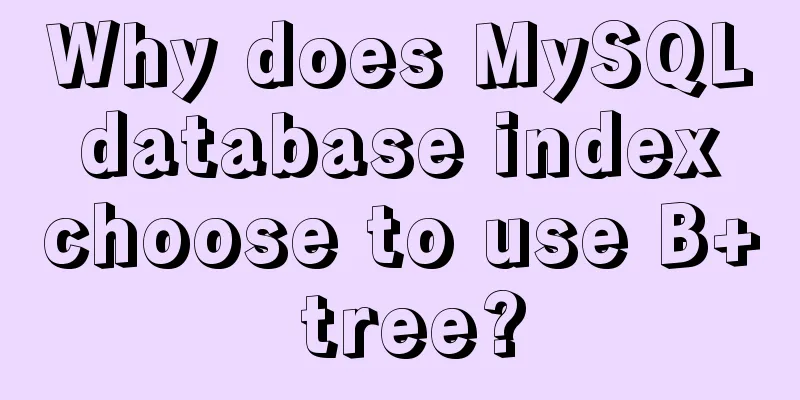Summary of several situations in which MySQL indexes fail

|
1. Indexes do not store null values More precisely, single-column indexes do not store null values, and composite indexes do not store values that are all null. Indexes cannot store Null values. Therefore, when the is null condition is used for this column, the index cannot be used because there is no Null value in the index, and the entire table can only be scanned. 2. Not suitable for columns with fewer key values (columns with more duplicate data) If the index column TYPE has 5 key values and there are 10,000 records, then WHERE TYPE = 1 will access 2,000 data blocks in the table. 3. Leading fuzzy query cannot use index (like '%XX' or like '%XX%') Suppose there is a column of code whose values are 'AAA', 'AAB', 'BAA', 'BAB', and if there is a condition where code like '%AB', since the previous condition is ambiguous, the order of the index cannot be used and the values must be searched one by one to see if the condition is met. This will result in a full index scan or a full table scan. If the condition is where code like 'A % ', you can search for the position of the CODE starting with A in CODE. When you encounter data starting with B, you can stop searching because the subsequent data will definitely not meet the requirements. This way you can take advantage of the index. 4. Several situations where index failure occurs 1. If there is an or in the condition, it will not be used even if there is an index in the condition (this is why or is used as little as possible) select * from tb1 where nid = 1 or name = '[email protected]'; --Special: The or condition will be invalid only when there is a column that is not indexed. The following will use the index select * from tb1 where nid = 1 or name = 'seven'; select * from tb1 where nid = 1 or name = '[email protected]' and email = 'alex' 2. For a multi-column index, the index will not be used unless it is the first part to be used 3.Like query starts with % select * from tb1 where email like '%cn'; 4. If the column type is a string, the data must be quoted in the condition, otherwise the index will not be used. elect * from tb1 where email = 999; 5. If MySQL estimates that a full table scan is faster than an index, it does not use the index. 6. Ordinary index does not mean no indexing - != select * from tb1 where email != 'alex' --Special: If it is a primary key, the index will still be used select * from tb1 where nid != 123 -> select * from tb1 where email > 'alex' --Special: If the primary key or index is an integer type, the index will still be used select * from tb1 where nid > 123 select * from tb1 where num > 123 7. Leftmost prefix of composite index If the combined index is: (name, email) name and email -- using index The above is a detailed summary of several situations in which MySQL indexes fail. For more information about MySQL index failures, please pay attention to other related articles on 123WORDPRESS.COM! You may also be interested in:
|
<<: Detailed steps to deploy SpringBoot projects using Docker in Idea
Recommend
Detailed explanation of Nginx timeout configuration
I recently used nginx in a project, and used Java...
Master-slave synchronous replication configuration of MySQL database under Linux
The advantage of the master-slave synchronization...
Web development tutorial cross-domain solution detailed explanation
Preface This article mainly introduces the cross-...
Which is faster among MySQL full-text index, joint index, like query, and json query?
Table of contents Query Background 1. Like query ...
jQuery implements the drop-down box for selecting the place of residence
The specific code for using jQuery to implement t...
Implementation of adding visit count function in github+Jekyll blog in one minute with JS
Table of contents Add traffic function to github+...
Mybatis mysql delete in operation can only delete the first data method
Bugs As shown in the figure, I started to copy th...
Solution to HTML2 canvas SVG not being recognized
There is a new feature that requires capturing a ...
MySQL 5.7.17 installation graphic tutorial (windows)
I recently started learning database, and I feel ...
Simple example of adding and removing HTML nodes
<br />Simple example of adding and removing ...
Front-end development general manual (including tools, websites, experience, etc.)
Today I have nothing to do, so I listed some tool...
Preventing SQL injection in web projects
Table of contents 1. Introduction to SQL Injectio...
Detailed explanation of Vue plugin
Summarize This article ends here. I hope it can b...
JavaScript macrotasks and microtasks
Macrotasks and Microtasks JavaScript is a single-...
Implementation of Docker private library
Installing and deploying a private Docker Registr...









